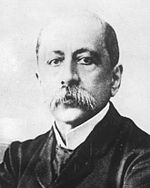Also known as:
Harilaos Trikoupis, Χαρίλαος Τρικούπης
More People of Greece
More Topic Categories
Related Destinations
Charilaos Trikoupis (11/07/1832 - 30/03/1896)
 Charilaos Trikoupis was a Greek diplomat, politician and Prime Minister. During his last term, his government could not cope with the country’s debt to foreign debtors, thus causing Greece to default.
Charilaos Trikoupis was a Greek diplomat, politician and Prime Minister. During his last term, his government could not cope with the country’s debt to foreign debtors, thus causing Greece to default.He was born in Nafplio in 1832, son of a politician. He attended school in Athens and studied law at University of Athens and later Paris. After his studies, he became a secretary to his father, who at the time served as an ambassador in London; later, he became a procurator of the Second National Assembly of the Greek community in London, and managed to successfully negotiate with the British government at the concession of the Ionian Islands from Great Britain to the Kingdom of Greece.
In 1864, he resigned from diplomatic service to participate in the elections. He became a Member of the Parliament, and in 1866, he was assigned to the Ministry of Foreign Affairs for a short term. In 1872, he founded the “Fifth Party”, gathering the more liberal politicians of the era. In 1874, after the crown anointed Voulgaris as Prime Minister, despite being defeated in the elections, Trikoupis published an article called “Who’s to blame?”, blaming the political system, but indirectly criticizing the king. A second article followed, forming the “principle of trust”; according to the principle, a government, which is not directly elected by the people but is anointed by the king, should only be formed if it receives the majority of the parliamentary votes. For this article, the publisher was initially arrested, considered to be the author, but Trikoupis then took responsibility and was incarcerated for a very short period.
He became Prime Minister in April 1875 by the king, but in the following elections, he was forced to resign as opponent Koumoundouros received the majority of the votes. He later won the elections of 1879, 1882, 1886 and 1887, but lost in 1890. In 1892, after winning the elections and during his last term as Prime Minister, Greece defaulted and stopped paying its debtors. He died in 1896.
During his term, he reformed the police, the rural police and the Military School of Evelpides; he promoted laws concerning the skills and promotion of civil servants; he expanded the railroad network and was in charge of creating the Corinth Canal, which was inaugurated in1893. Trikoupis pursued a very promising modernization of the country, which had many difficulties though, especially due to the problematic economy and the prevalent conservative spirit in the country. His opponent, Tselepitsaris, also threw hurdles to Trikoupis, by organizing demonstrations against him. Characteristic of Trikoupis’ progressiveness is his ambition to link the cities Rio and Antirrio over the water, which materialized over a century later, in 2004, with the construction of the Rio-Antirrio Bridge. In fact, in 2007, the bridge was named after Trikoupis.
In general, Trikoupis’ actions were among the most important that helped in the country’s transition into the 20th century. Although his work was controversial at the time, the effects are visible even today. For this reason, he is considered one of the greatest politicians of Greece.
See Also:
 Athens Photos
Athens Photos
 Santorini Photos
Santorini Photos
 Crete Photos
Crete Photos
 Meteora Photos
Meteora Photos
 Corfu Photos
Corfu Photos




